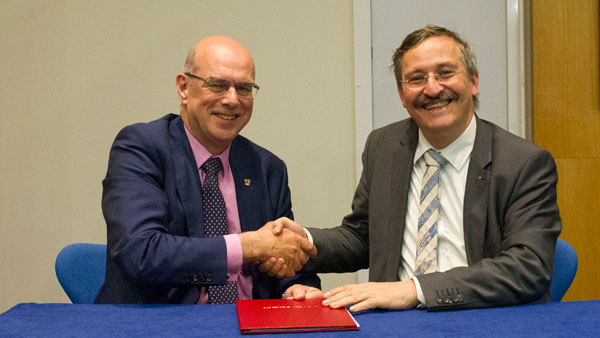Navigation auf uzh.ch
Navigation auf uzh.ch

Universitas 21 was founded in Melbourne in 1997 and, in the meantime, has grown to a leading global network of universities. The mission of the collective is to promote internationalization processes in research and higher education.
The network enables staff and students at the member institutions to enter into dialogue with one another, to learn from one another, and to support each other on a variety of levels. In particular, Universitas 21 fosters student mobility, research collaboration, and joint development of innovative, research-driven teaching methods. Other main priorities in collaboration include academic career development and the continual development of the institutions.
Universitas 21 comprises 26 excellent higher education institutions – including UZH – from six continents; other member institutions are Fudan University in Shanghai, Waseda University in Tokyo, UNSW Sydney, the University of Edinburgh, and the Tecnológico de Monterrey in Mexico.
Joint projects within the network are conducted on various academic levels and in a variety of subject areas. Universitas 21 organizes numerous activities and cooperation platforms for the staff and students of the member institutions, for instance, a student summit, a summer school, an undergraduate research conference, and a global citizen workshop. There are also groups for researchers in all career phases, a platform for the heads of graduate degree programs, a steering committee for innovation in higher education teaching, a network for teaching and education in addition to many other collaborative opportunities.
“Our membership in Universitas 21 is a major step toward realizing our internationalization strategy,” says UZH President Michael Hengartner. This is the second international network of research-intensive universities in which the University of Zurich has membership, the first being the League of European Research Universities (LERU), where UZH has been a member since 2006. “It is excellent that UZH is a member in both Universitas 21 and LERU,” according to Michael Hengartner. “UZH remains a proud member of LERU, which has a major role in European higher education policy, and our membership in Universitas 21 strengthens our visibility outside of Europe.”
This spring, the University of Zurich signed yet another important international cooperation agreement: A strategic partnership with Freie Universität Berlin was concluded in April. “Although bilateral strategic partnerships have a smaller radius of effect than large networks, the advantage is that we can work with a like-minded university to develop tailor-made, long-term joint projects in research, teaching, and administration,” says Hengartner. He believes that UZH needs both types of partnerships to continue gaining stature and profile on the international stage and to be a part of the latest developments in research and higher education.